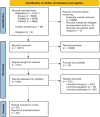Triage tools to inform the prioritisation of physical health services following a diagnosis of cancer: a scoping review
- PMID: 40767922
- PMCID: PMC12328539
- DOI: 10.1007/s00520-025-09816-9
Triage tools to inform the prioritisation of physical health services following a diagnosis of cancer: a scoping review
Abstract
Purpose: Many people face multiple cancer- and treatment-related sequalae. Triage and referral to physical health services can manage such consequences, but a comprehensive understanding of available triage tools is lacking. This review (i) identifies tools used to triage to physical health services, (ii) maps tool characteristics and application outcomes and (iii) summarises existing gaps.
Methods: A systematic search was conducted (three databases, April 2024). Articles were included if they used a tool to triage to physical health services. Tools were classified by triaged disciplines (i.e., diet, exercise, physical rehabilitation, multidisciplinary) and screened physical impairments (e.g., malnutrition). Tool characteristics (e.g., triage method) and application outcomes (i.e., reach, triage rates) were extracted.
Results: Of 23,369 records retrieved, 67 studies were included. Studies comprised 78 instances of tool use (64 unique tools), where n = 33 triaged to dietetics (42%), n = 6 exercise (8%), n = 11 physical rehabilitation (14%), and n = 28 a combination of health disciplines (36%). Mean age was 65 years. Most tools were used during-treatment (45%), in hospital settings (62%), measured malnutrition/physical function (60%) and used single cut-off scores (68%). Reach and triage rates varied, with exercise (reach = 89%) and diet (triage = 63%) rates highest.
Conclusion: Many physical health triage tools exist, most solely for dietetics, with heterogeneous characteristics and application outcomes. Updated tools are needed for triage to exercise/physical rehabilitation, multiple age cohorts across the cancer continuum, and that potentially use multiple cut-off scores. Cancer care professionals can use this compendium to identify which tool characteristics best suit their healthcare setting, for optimal outcomes.
Keywords: Health services; Needs assessment; Oncology; Physical rehabilitation; Supportive care.
© 2025. The Author(s).
Conflict of interest statement
Declarations. Ethics approval: Not applicable for systematic scoping review. Consent to participate: Not applicable for systematic scoping review. Consent to publish: Not applicable for systematic scoping review. Competing interests: The authors declare no competing interests.
Similar articles
-
Prescription of Controlled Substances: Benefits and Risks.2025 Jul 6. In: StatPearls [Internet]. Treasure Island (FL): StatPearls Publishing; 2025 Jan–. 2025 Jul 6. In: StatPearls [Internet]. Treasure Island (FL): StatPearls Publishing; 2025 Jan–. PMID: 30726003 Free Books & Documents.
-
Interventions for promoting habitual exercise in people living with and beyond cancer.Cochrane Database Syst Rev. 2018 Sep 19;9(9):CD010192. doi: 10.1002/14651858.CD010192.pub3. Cochrane Database Syst Rev. 2018. PMID: 30229557 Free PMC article.
-
Factors within the clinical encounter that impact upon risk assessment within child and adolescent mental health services: a rapid realist synthesis.Health Soc Care Deliv Res. 2024 Jan;12(1):1-107. doi: 10.3310/VKTY5822. Health Soc Care Deliv Res. 2024. PMID: 38314750
-
Falls prevention interventions for community-dwelling older adults: systematic review and meta-analysis of benefits, harms, and patient values and preferences.Syst Rev. 2024 Nov 26;13(1):289. doi: 10.1186/s13643-024-02681-3. Syst Rev. 2024. PMID: 39593159 Free PMC article.
-
Signs and symptoms to determine if a patient presenting in primary care or hospital outpatient settings has COVID-19.Cochrane Database Syst Rev. 2022 May 20;5(5):CD013665. doi: 10.1002/14651858.CD013665.pub3. Cochrane Database Syst Rev. 2022. PMID: 35593186 Free PMC article.
References
-
- Bray F, Laversanne M, Sung H, Ferlay J, Siegel RL, Soerjomataram I, et al (2024) Global cancer statistics 2022: GLOBOCAN estimates of incidence and mortality worldwide for 36 cancers in 185 countries. CA: A Cancer Journal for Clinicians, 74:229–63. 10.3322/caac.21834 - PubMed
-
- Smith SR, Zheng JY, Silver J, Haig AJ, Cheville A (2020) Cancer rehabilitation as an essential component of quality care and survivorship from an international perspective. Disabil Rehabil 42:8–13. 10.1080/09638288.2018.1514662 - PubMed
-
- Paterson C, Toohey K, Bacon R, Kavanagh PS, Roberts C (2023) What are the unmet supportive care needs of people affected by cancer: an umbrella systematic review. Semin Oncol Nurs 39:151353. 10.1016/j.soncn.2022.151353 - PubMed
Publication types
MeSH terms
LinkOut - more resources
Full Text Sources
Medical
Miscellaneous


